- Sahoobazar,Sutahata, Haldia- West Bengal
- +91 8653 403 309
- info@eldercareindia.org
Stories of Our Family Members
offering a nurturing environment, comprehensive care, and a sense of belonging
Eti Sen: At Maa Briddhashram, Eti Sen found what she had been denied for most of her life—dignity, peace, and a true sense of belonging. The care home offered her not just a roof over her head, but a community that saw her. She actively participated in yoga sessions, monthly outings, World Senior Citizens' Day celebrations, and cultural activities. She was no longer invisible. She adores Rabindra Sangeet, and her favorite meals include rice with fish curry, biryani, and traditional Bengali sweets. Though she has always loved sweets, her life had remained bitter— until now. Eti Sen has always been strong-willed. Though life denied her the love and care she gave so freely to others, she never allowed bitterness to define her. Today, she lives in peace—free from abuse, neglect, and exploitation. Here, she is seen, heard, and respected. Her life is like a short story—one that may end on paper, but continues forever in emotion. The memory of her first love still flickers within her, like an invisible but eternal flame. Eti Sen—a name that echoes with pain, strength, and quiet triumph. Life may have taken much from her, but it could never steal her soul’s dignity. In every breath, she teaches us that courage is not always loud—sometimes, it’s silent, steady, and deeply human.
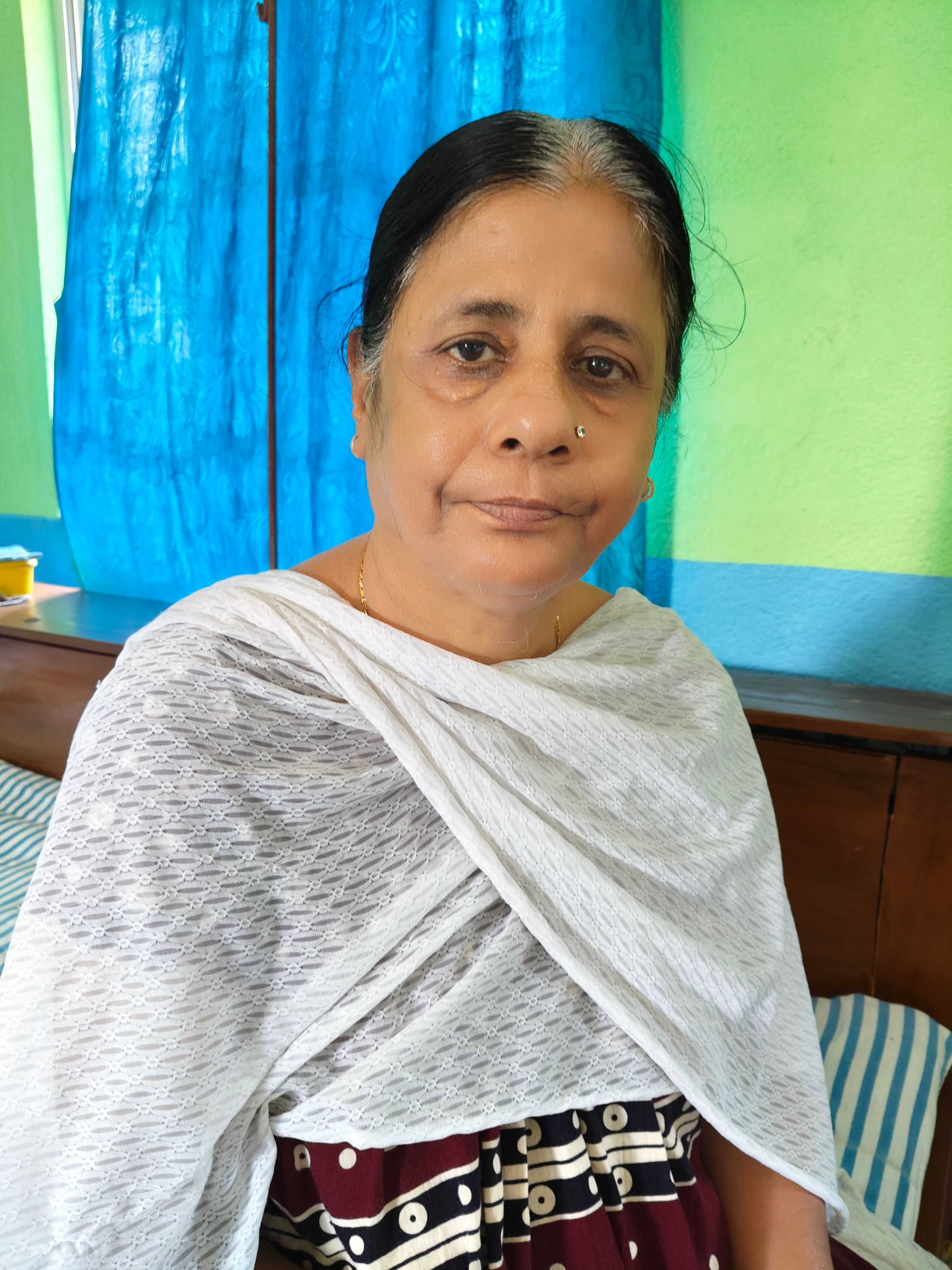
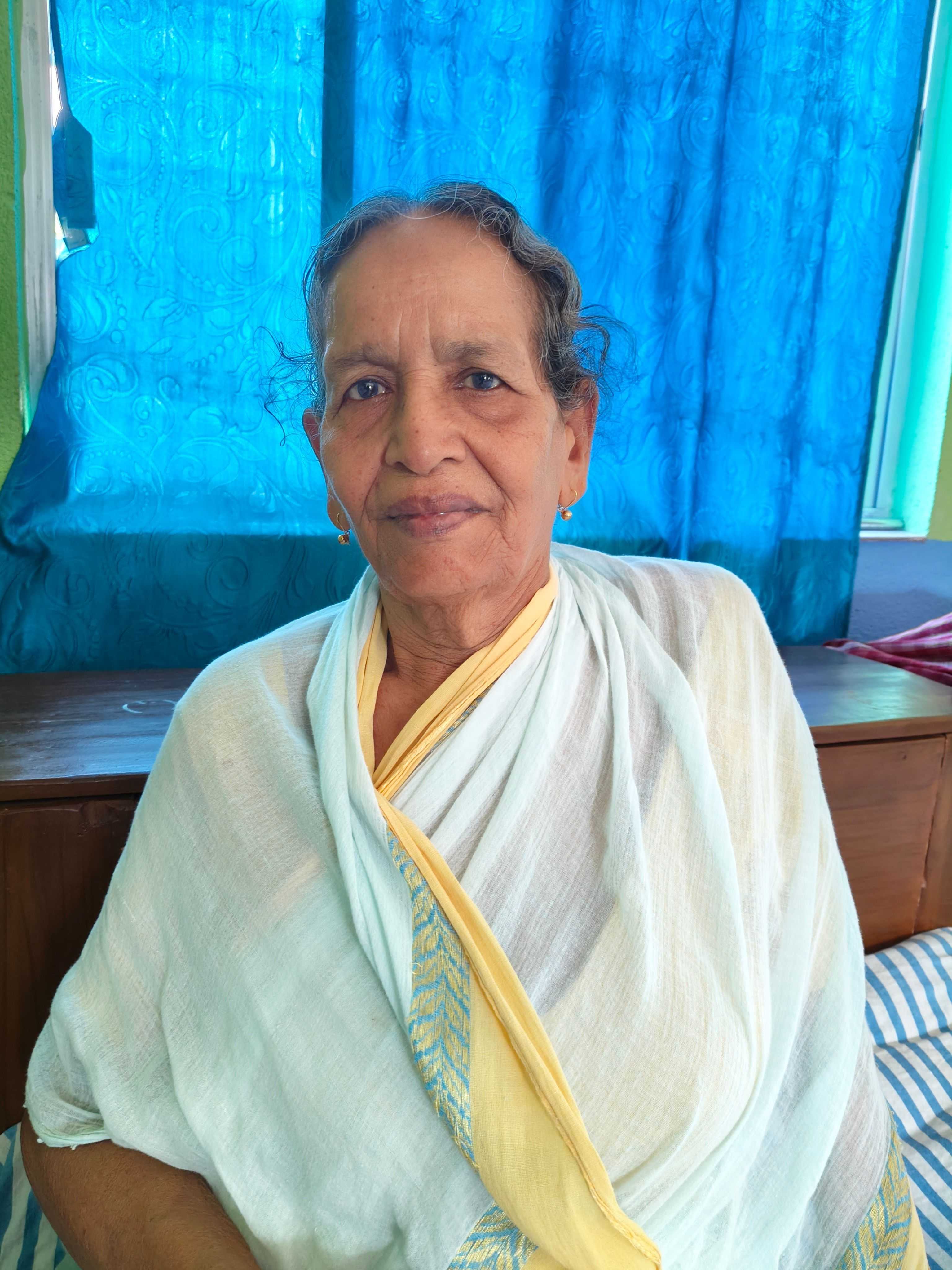
Gauri Mukherjee: Life is not the same for everyone. For some, it's like a dream painted on a canvas with vibrant colors, while for others, it's a relentless walk through dust and shadows. Some are born into love and comfort, while others spend their whole lives searching for a sliver of shelter. Yet, in this grand theatre of the world, we all play our parts—each in our own way. Today, we bring to you the story of a true warrior—70-year-old Gauri Mukherjee, a new member of the “Maa Old Age Home” under the Elder Care India family. Her life is not merely a chronicle of old age; it is an unforgettable tale of courage, endurance, and inspiration. Gauri Mukherjee was born in Ultadanga, Kolkata. Her early years were nurtured with the affection of her father, Prafulla Krishna Choudhury, and mother, Saroj Choudhury. But poverty loomed over them like an ever-present storm. With six siblings, education became a distant dream. She never had the chance to go to school and instead joined her mother in making paper packets to help support the family. At just 16, Gauri was married to Shyama Prasad Mukherjee, following her father’s wishes. Life in a small rented house in Kolkata was modest, yet filled with love. Soon, the birth of their only child lit up their humble home with joy. But happiness, like time, is fleeting. Tragedy struck when their child passed away at the tender age of five. That wound never healed. They never had another child, but her husband's unwavering love kept her life warm and whole. About ten years ago, her husband passed away—and with him, the light in her life seemed to fade. What followed was a lonely, brutal struggle for survival. When she turned to her sister for shelter, she received nothing but rejection and abuse. Her nephew wished to help her, but fear of his mother’s anger held him back. Recalling those days, Gauri Devi says, “When I remember those days, my heart burns. I don’t want to think about it... but I can’t forget.” Yet, she did not give up. Her hair may have turned grey, glasses may rest on her eyes—but those eyes still sparkle with the light of life. She enjoys chili chicken, fried rice, and Katla fish. Music is her companion—be it Hindi, Bengali, Rabindra Sangeet, or folk songs. In melodies, she finds the rhythm of life she refuses to let go of. Today, there’s a quiet dignity in her presence. She makes no complaints, asks for nothing— only wishes to spend the rest of her days in peace, surrounded by love.
Ira Basu: —a name that echoes the quiet strength of a woman who lived a life of sacrifice, silent resilience, and unwavering dignity. Born in Barishal, Bangladesh, into a culturally rich and respected family, Ira’s early life was one of stability and promise. Her father was a fearless freedom fighter and a man of strong moral values. His devotion to society shaped Ira’s character from a young age. The family owned ample land and lived with honor and prestige. But fate, ever unpredictable, forced them to leave their ancestral home when Ira was just fifteen. Leaving behind her roots, homeland, and cherished memories, Ira arrived in India with her parents, stepping into an uncertain future. Their first shelter was a modest home in Bhangar, South 24 Parganas. But life soon dealt another cruel blow. The sudden loss of her mother created a void that could never be filled. Struggling through grief and hardship, the family relocated to a rented house on Park Street in Kolkata, where each day became a new battle for survival. At the time of migration, Ira was a ninth-grade student in Bangladesh. Despite this disruption, she resumed her education in India and displayed extraordinary academic brilliance by securing the ninth rank in the secondary board examinations. Although she earned the opportunity to study science, financial hardship and the burden of family responsibilities forced her to abandon her formal education. After her mother’s death, the entire responsibility of the household fell on Ira’s young shoulders. Tragedy struck again when both her elder and younger sisters passed away unexpectedly. Hunger and hardship became her constant companions. Yet, Ira never gave up. With the support of the Communist Party of India, she secured a job as a mathematics teacher in a local school—an opportunity that helped stabilize the family's crumbling foundation. Her sacrifices bore fruit, as her three brothers eventually found employment and began to rebuild their lives. Putting her own dreams aside, Ira became the guardian and nurturer of her siblings. She raised them, supported their education, and helped settle their lives. Marriage was never an option— not because she didn’t desire it, but because duty had consumed her entirely. She had become a full-time caregiver, bound by love and responsibility. Amidst these hardships, one person remained her constant source of emotional strength—her neighbor and close friend, Malati Chakraborty. Ira found solace in sharing her deepest feelings with Malati, who stood by her like a sister. But life had more trials in store. Ira’s elder brother passed away suddenly, and once again, she was left to care for yet another grieving family. Sadly, her sister-in-law treated her with cruelty—verbally abusing her, disrespecting her, and at times, even subjecting her to physical harm. Yet, Ira chose to endure it all. She believed that blood ties were sacred, and severing them was not an option. Her youngest brother was especially dear to her, and he loved her deeply in return. However, his wife resented their close bond. Still, Ira’s love knew no boundaries. She loved all her siblings equally, as a mother loves her children—unconditionally and endlessly. From childhood, Ira was known for her cheerful disposition, gentle voice, and a quiet sense of pride. Reading books and sewing were her favorite pastimes—not as professions, but as sources of peace and joy. She never sought recognition or praise. Her wealth lay in the kindness she offered and the respect she gave to others. Her beauty, too, was radiant and unforgettable. So that people fondly called her “Heera”, meaning diamond. Yet, society failed to give her the honor she truly deserved. Her sacrifices, her devotion, her silence—these were often overlooked. But the divine did not forget. In her twilight years, Ira finally found shelter, dignity, and peace at the “Maa” Old-Age Home—a place that gave her a true sense of belonging.
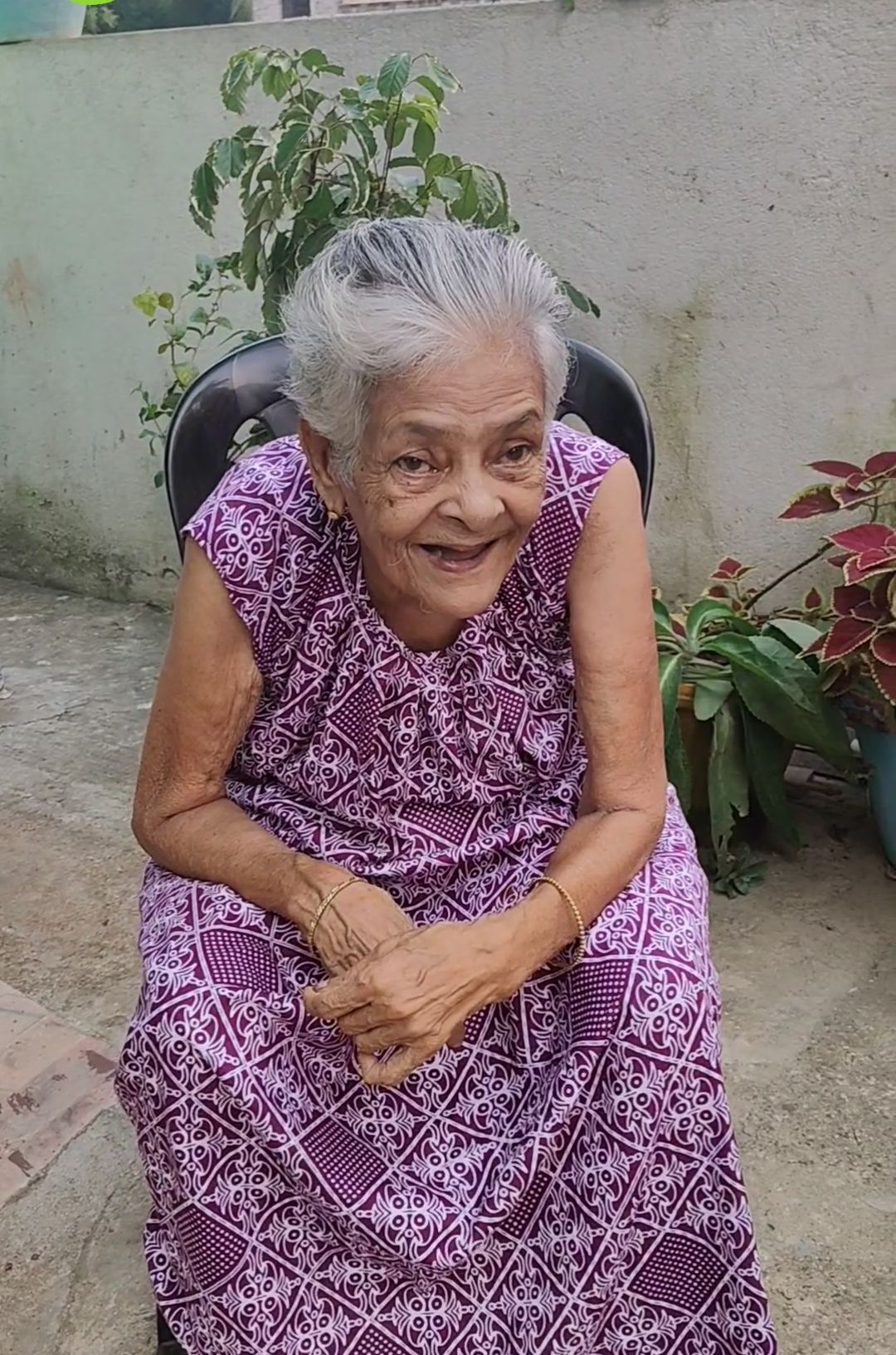
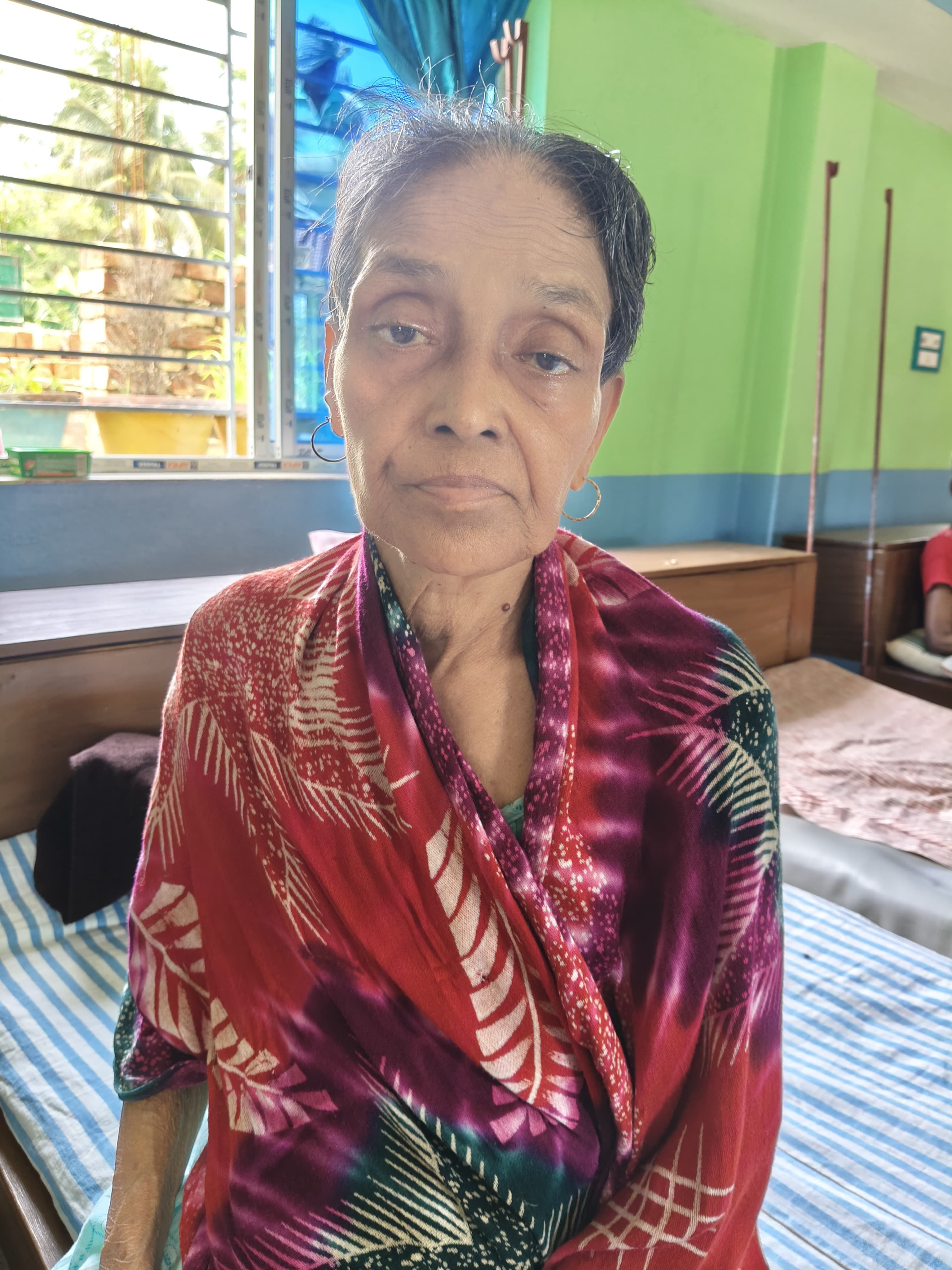
Jharna Das: Just like a river, when blocked, carves out a new path, human life too finds new directions amidst obstacles. Sometimes life is shattered, only to begin again with a fresh flow. Jharna Das is one such life—where heartbreak met hope. Born in Gundolpara, a small locality in Dhulagorh, Howrah, Jharna grew up in a modest family. Her father, Kartik Senapati, was a daily wage laborer, working on others’ farmlands to feed the family. Her mother, Asima Senapati, battled poverty every day just to keep food on the table for their children. Jharna’s childhood dreams were silenced by hardship. She never had the chance to pursue education. At just 18, she was married to a kind man who worked in a battery factory in Dharmatala, Kolkata. The couple lived in a rented house in Lake Town. Though they had no children, their bond was filled with peace, love, and mutual respect. Later, her husband was transferred to Bankura, and the couple relocated. But life took a harsh turn on 12th April 2016—her husband suffered a sudden brain stroke and passed away. In a moment, Jharna lost not only her partner but her entire world. With nowhere else to go, she found temporary shelter at the home of her husband’s factory owner. She survived on a weekly sum of ₹200 and an old-age pension. It was barely enough to live on. But life doesn’t always stop at sorrow. Sometimes it whispers quietly, “I want to live.” Jharna had high blood sugar and struggled daily with her health. The room she was given was dark and damp, with not even a sliver of sunlight. During monsoons, the floor would flood with knee-deep water. She cooked her own meals in that unhygienic space. Her legs developed infections, and her body and mind grew weak with time. Yet, in this darkness, a ray of kindness shone through. A young woman from the neighborhood would cook for her twice a day—for three years straight. That compassion kept her spirit alive. Jharna loves sweets. She finds joy in listening to old Bengali film songs. Despite her circumstances, she remained conscious of her health, carefully managing her diet according to her medical needs. There was a quiet grace in the way she held on to life. One day, the battery factory owner came across the work of Elder Care India on social media. Moved by their mission, he reached out. Soon, a survey team from the organization visited Jharna. Through heartfelt conversations, they uncovered the silent suffering and quiet resilience of a woman who had been living in shadows. Elder Care India brought Jharna to Maa Old Age Home—a safe, loving space where she found not just shelter, but dignity and care, where age doesn't mean helplessness - where every mother finds love, care, and safety once again.
Parul Malik: Born in a quiet village in Memari, Purba Bardhaman district, Parul Mallick came into this world as the only daughter of a humble farming family. Her early years were marked not by the joys of childhood but by the shadows of profound loss. She lost her mother to dysentery, and not long after, her father succumbed to cancer. Before she could even understand what life truly meant, she was thrust into a battle for survival. Parul’s childhood was defined by poverty and uncertainty. There were many days when she didn’t get to eat a full meal. Rice—a staple for many—was a luxury she rarely tasted. Her meals often consisted of wheat or corn flour. In 1949, a devastating flood ravaged her small bamboo hut, stripping her of the little shelter she had. Yet, Parul survived, holding on to life with quiet resilience. After being orphaned, she was taken in by her maternal aunt. Under her aunt’s care, Parul slowly grew up. But childhood ended abruptly. At the tender age of 12, she was married off. Her husband, though quiet and kind, came from a modest background. Together, they built a simple, peaceful life, and she gave birth to a daughter. Parul devoted herself fully to her family. After her daughter completed her secondary education, Parul sold off the little land to arrange her marriage. But joy was fleeting—soon after the wedding, her son-in-law passed away. The blow shattered her emotionally, yet she kept going for the sake of her daughter and, eventually, her grandchildren. She moved in with her daughter and became the backbone of the household, raising four grandsons with love, care, and sacrifice. Widowed and weary, Parul hoped her twilight years would be spent in peace, surrounded by the family she nurtured. But as time passed, age wore down her body, and her presence slowly became unwelcome. No longer able to work or help around the house, she began hearing cruel words from her own flesh and blood. “Who’s going to feed you?” her daughter once said. Her grandsons, whom she had raised like her own, told her, “Dida, just leave.” Her heart broke—not from poverty, but from the sting of abandonment. Eventually, she was forced to leave the home she had helped build, wandering from one house to another in search of a meal and a place to rest. It was during this desperate chapter that Elder Care India found her. With compassion in their hearts, they brought her to Maa Briddhashram—a sanctuary for the elderly. On her first day there, she humbly asked, “Will you give me a small place to stay? I’ll work for my food.” Today, Parul Mallick—once a woman crying for shelter—is finding joy and dignity once again at Maa Briddhashram. No longer a burden, she is embraced as a person, with stories, emotions, and a life that matters. Her face now glows with a quiet smile, and she often says,
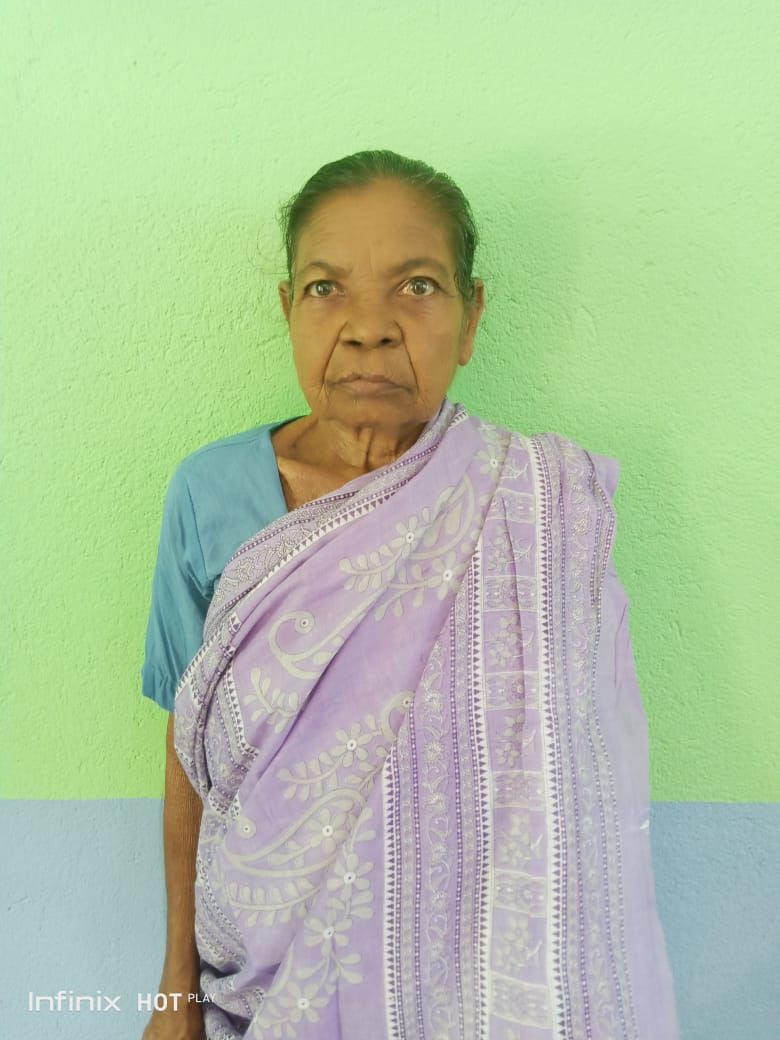
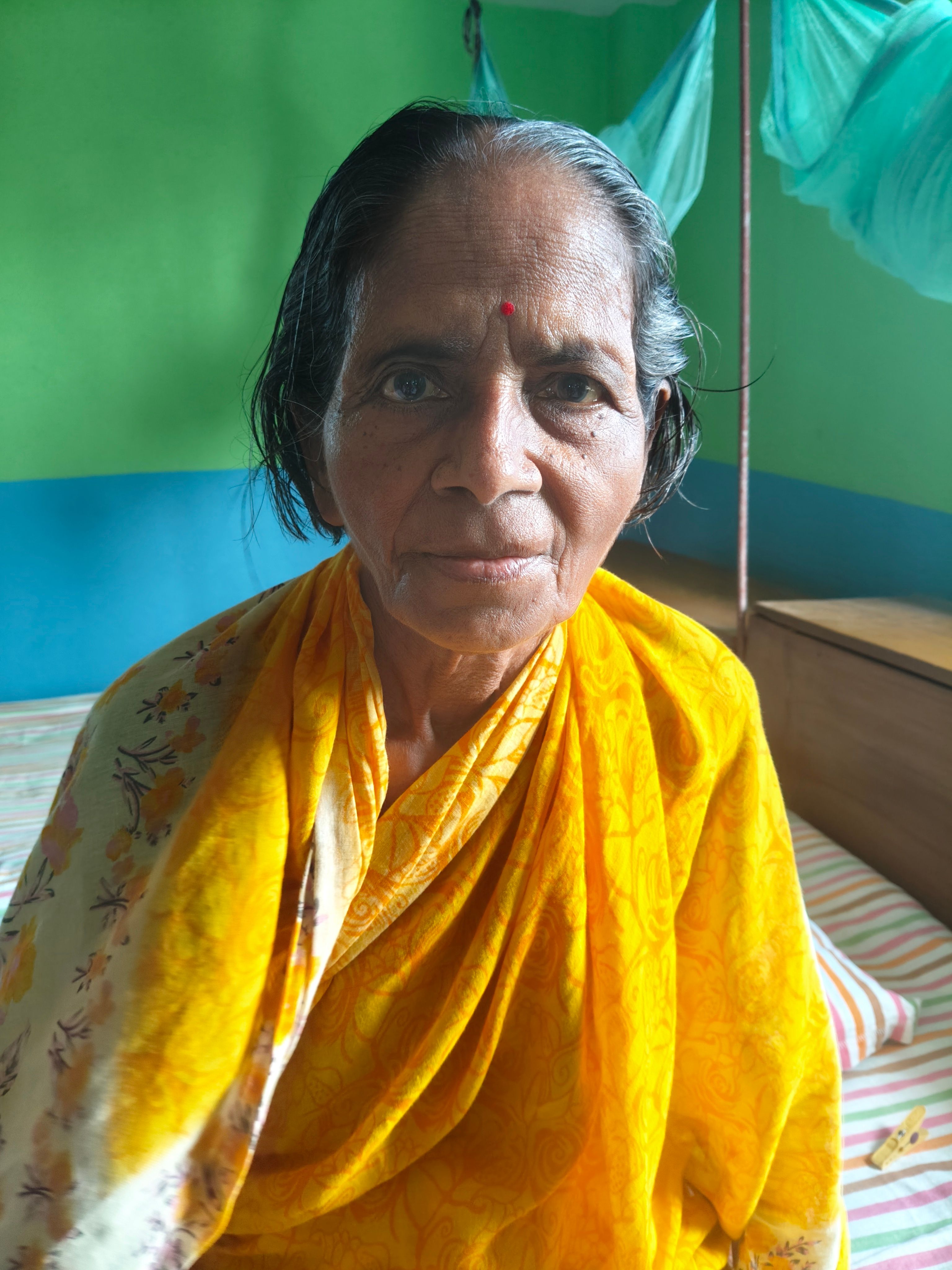
Shankari Samanta: There are some stories that weep in silence, yet smile through their scars. Stories that carry a chest full of sorrow, and still hold onto the light. Shankari Samanta’s story is one such tale. She was born in a small village called Udaynarayanpur, in the Howrah district of West Bengal. She grew up in a bustling household with eight siblings—surrounded by the warmth of sibling bonds, carefree games in the courtyard, and a loving embrace of her parents. Her father worked as a manager in a shipping company. There was no poverty, but the family’s true wealth lay in their simple joys and deep affection. At the young age of seventeen, Shankari was married to a respectable government employee. The early years of her marriage felt like a dream—filled with love, hope, and completeness. But life, as always, had its own script. Suddenly, her husband lost his job. Financial struggles began to cloud their days, and slowly, layers of silent pain began to settle into her heart. Yet, the cruelest wound was not poverty, but the realization that she would never become a mother. That one hope which every woman nurtures in her soul remained unfulfilled. A few years later, her husband passed away after a painful battle with cancer. And just like that, she found herself alone—childless, widowed, and abandoned by fate. But Shankari Devi did not give up. She looked for comfort in relatives’ homes. Only one niece embraced her with unconditional love. But life struck again—a tragic accident took that niece away forever. So, did life come to a halt? No. That was when the real journey of her soul began. A young man—not by blood, but by love— stepped into her life like a ray of hope. He introduced her to Elder Care India and brought her to “Maa Old Age Home.” It was here that Shankari Samanta rediscovered herself—a second life blossomed in the twilight of her years. "At Maa Old Age Home, I’ve learned to live again. When there is love in your heart, no chapter of life is ever truly over.” Today, she is not just a member of our home—she is the soul of it. A symbol of quiet strength, a woman whose life teaches us that— Love is not limited to blood—it flows from the heart. A woman without children can still become a mother to many hearts. Even from the deepest void, a new morning can rise.
Sunita Devi: Let's hear how Eldercare India rescued a woman named Sunita Devi from the sidewalks of the city center, giving her a new lease of life and returning her to her own home. It was on December 25, 2022 the day the President of Elder Care India saw her in distress at the intersection of City Center. After keeping an eye on her for 3 consecutive days, the team of Eldercare India rescued her on the chilly evening of December 28 at around 6 pm. At that time, Sunita Devi was wearing a torn saree, holding a stick and a small bag. In this condition, she was brought to the old age home. A strong stench was coming out of her body. The home staff bathed her and changed her clothes. Then we noticed that she was not talking to anyone, was muttering to herself, shouting for no reason, even coming forward to beat the staff of the home. As a result we realized that he was a mentally unbalanced person. Day by day her nuisance continued to increase. She didn't want to take a bath. She was forced to bathe every day. She used to get angry with the one who bathed and changed her clothes. She used to eat more than she needed and after eating, she kept a lot of food in her bag for the next day, just like she used to do when she was on the pavement. She used to keep other people's things with herself. Seeing all these reactions, she was treated by psychiatrist Dr. Indrajit Sengupta. She would almost fall asleep after taking the medicine as prescribed by the doctor and would have the same reaction after waking up. At this time she used to leave the home by opening the gate, chasing the children on the street. Thus seven months passed and we noticed many changes in her. There was a change in her personality. She became a calm person, kept doing her chores, got along with everyone in the home, helped other elders as needed. These changes in her made her a normal human being. She started going for morning walk in the morning with the old people of the home, talking openly with everyone. The turbulent atmosphere of the old age home calmed down. After that she sometimes talked about her house, address, children, which was unimaginable to us. But then we realized that her past memories were coming back little by little and she kept expressing her desire to go home. To fulfill her wish we verified the address given by her and decided to take her home after consultation with the police. Then on 4th of July our team made all the necessary arrangements and got her on the train. On 5th July, she went alone to her sister's house in Salaiya village in Bihar. After 5 years, her sister was shocked to see her as the whole family knew that Sunita Devi was dead. We came to know from her sister's conversation that she is a daughter of a noble family. She is survived by her husband, 6 sons and 1 daughter. Due to a dispute over property with her husband, she fell victim to mental illness and left home. What a cruel irony of fate! On hearing that she was alive, her 6 sons took her back home. Eldercare India wishes Sunita Devi a healthy and safe life. We feel blessed to be standing next to a person like Sunita Devi.
.png)
.jpg)
Sandhya Devi: Today's 70-year-old Sandhya Baker was born in a small village of Belgachia in the capital Kolkata. She was growing up with ten siblings. She was not educated due to poverty. As she grew older, she married a Christian boy of her choice with the help of a friend during her youth. Due to Sandhya and Brine's religious differences, the two families started a major turmoil. Her husband was a bus conductor by profession. Due to scarcity, there was chaos in the family. On the other hand, the husband was intoxicated. Due to her husband's torture, her father thought of marrying off her daughter for the second time. After that, she became pregnant. Brine Bakar did not fulfill any of the duties of a husband and father. She had to move here and there for food and a roof over his head. After that, the husband and wife started living separately. The difference between the parents caused the girl a lot of pain. The daughter became independent and took the responsibility of her mother. But after marriage, the girl left her in Kolkata and went to Bihar. During this time she started working as a housekeeper to support herself. Suddenly she got the news that her husband died in a road accident. The grieving wife did not see her husband for the last time. Passengers on Brian Baker's last journey didn't know he had a wife and daughter. Eldercare India came to know about her life story and rescued her. His daughter said, "You couldn't stay with father, I couldn't keep you. Finally, your address is anold age home." This taunting "Old age home" has given her a new direction today.
Bina Devi: Let's listen to the life story of Bina Santra, a 65-year-old woman from Harsuna village inPurbaBardhaman district, who is in our old age home. Her father died at a very young age. She was growing up with her mother and brothers. Due to poverty,she did not have the opportunity to study in school. She was married at the age of 14. Her married life was miserable. She brought up 6 children with difficulty. One of her sons committed suicide. The death of a child at anearly age deeply grieved her. Despite suffering from childhood, she did not get the love and peace she expected from her children. Even the children did not want to take her responsibility. A member of Eldercare India came to know about her situation and gave her the address of the old age home. She came to our old age home hoping for a peaceful life by holding the hand of that member to get rid of the life of hardship. Eldercare India has brought endless joy to her life. Even after receiving so much abuse from her children, a compassionate mother wants her children to be well. This is a mother's love.
.jpg)
.jpg)
Lakshmirani Devi: The old woman's name is Lakshmirani Pradhan. She is 85 years old. Her home is Nandakumar,Kumarara. She is the youngest among 4 siblings in the family. Her father worked as a day labourer and managed the family in hardship. At the age of 8, she was betrothed to a 25-year-old man. There was no end to her suffering at her father-in-law's house. She endured the abuse of her husband and brought up 4 children. After her husband died, she lived with her elder son. Suddenly, the elder son suffered from paralysis. She was forced to work hard to support herself due to poverty, starvation and misbehaviour of her son. She had no roof over her head to stay. Many years passed like this. A member of Eldercare India saw her working on the streets and came to know about her situation and assured her of a peaceful and secure life. Herdaughter-in-law prevented her from coming to the old age home for fear of censure. As she grew older, she lost his ability to work. Feeling her own helplessness, she wants to come to the old age home. Our team rescued her. Here she is spending her days well with everyone's love and care. SHe said, "The food that I did not get at the age of 85 years, I am getting that food here today."
Malati Devi: The old lady's name is Malati Hansda. She is 76 years old. She was born in a farming family in Sultanpur village of Purba Bardhaman district. Their family consisted of parents and ten siblings. There was no trace of education in the family. She used to sing, dance and even play theatre since childhood. She was married at a young age and soon had two daughters. As her husband got married for the second time, she went to her father's house with her two daughters. There she spent her days as a farmer. After marrying off her two daughters, she got the news that her husband had died. Within a few days, her elder daughter fell ill and died. The younger daughter could not bear the torture of her husband and died of poison. The untimely death of her husband and children in succession deeply grieved her. She lived in his brother's house doing farming and animal husbandry. Then she went to nephew’s house for shelter and spent her days begging. Her nephew contacted Elder Care India and sent her to an old age home to give her a better life. She is fine at home. Here sometimes she sings to us with the joy of his heart.
.jpg)
.jpg)
Sandhya Devi: Sandhya Shaw was born in Tamluk town of Purba Medinipur district. Her current age is 66 years. Being the eldest daughter of the house, she was very fond of her parents. The financial condition of the family was good. Her father was a businessman by profession. Being an elder sister, she took care of her younger siblings. Her father married her when she was only 9 years old. Within a year of marriage, she came to know that her husband was an evil, drug-addicted man. 10 years passed through poverty, misery and family turmoil. When the daughter was 4 years old, her husband married a second time. Although the father wanted to take responsibility for the 4-year-old child, he did not want to take responsibility for his first wife. So Sandhya Devi spent 14 long years in her father's house with her daughter. The girl grew up in her grandfather's house. She realized that her place in brother's family was not long. She continued to spend her days in her father's house, enduring the insults of her brother's wife. She was deprived of her father's property. Then after her daughter's marriage, she started working from a rented house in Tamluk. 15 years passed like this. The daughter's attraction to her mother, who had entered old age, was not strong. On her way back from Kolkata for work, she suddenly had a fatal accident on the road. At that time, the daughter and son-in-law avoided responsibility by giving excuses for fear of expenses. She recovered due to complete treatment from her father's house. Due to an accident in her old age, her work stopped. As she did not have shelter in the family of his brother and daughter, she started living in a rented house again. A member of Eldercare India came to know about her condition and rescued her. She is fine at home, she is not having any problem. She donates a large portion of her savings to the old age home, which shows her great heart.
Kananbala Devi: 85-year-old Kananbala Dey was born in a well-to-do family in Kelomal village of Tamluk. She spent her childhood days happily with 6 siblings. She was very loved by her parents. She had a good childhood. She got married to a married man through her uncle's connection. The married man's first wife was died and left behind a daughter. However, there was no defect in her husband's love in her life. She spent her days happily in the joint family of her father-in-law’s house. She brought up the 3-year-old daughter of her husband's first wife with care. Suppressing all the pain in her heart, she forgets to have children herself to fulfill her husband's wishes. Meanwhile, the girl could never give her the place of her mother. After the girl's marriage, her husband suddenly died in an accident. She became alone. In this situation the girl refuses to take her responsibility. Soshe herself moved to her sister's house in Mahishadal. After spending 20 long years in her sister's house, she sought the address of the old age home due to the turmoil in her nephew’s family. Eldercare India rescued her. She is quite happy to have other old people as companions in her lonely life in the old age home. Ironically, the one who had a good husband, abandoned her motherhood and ended up her life in an old age home.
.jpg)


